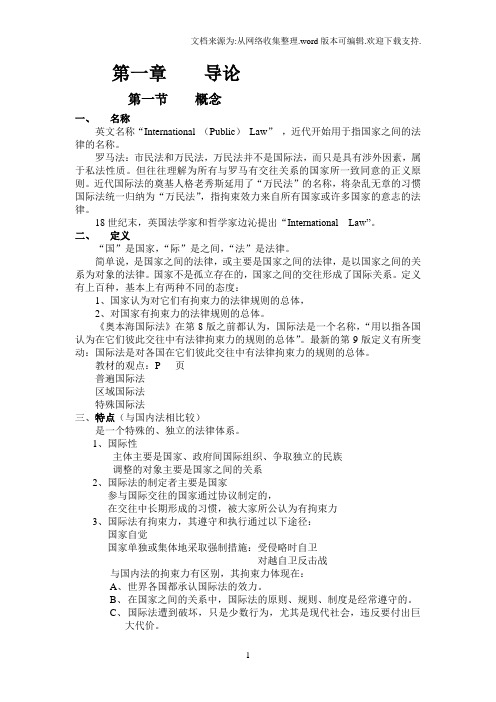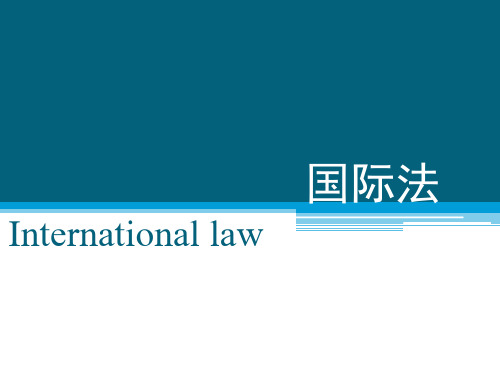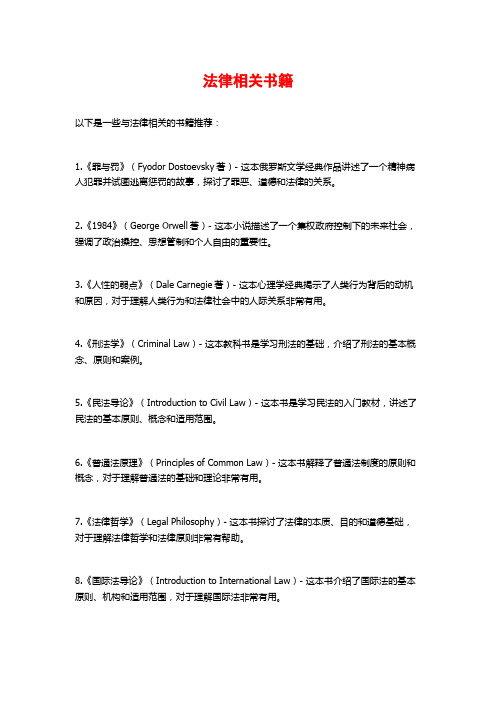国际法导论(英文)
国际法

国际法国际法第一章导论第一节国际法的概念一、国际法的概念和演变国际法(International Law)是一个与国内法相对应的法律体系。
它是国家间交往中形成的、主要是调整国家之间关系的、有拘束力的原则、规则和制度的总体。
国际法与国内法二者共同构成了当代人类社会完整的法律秩序。
国际法一词准确地反映出了其所覆盖的法律体系的基本特点和主要调整对象。
英国法学家边沁最早引入“国际法”一词,后被广泛采用。
有人使用“国际公法”(Public International Law)一词来称呼这一法律体系(其传人中国早期,也被称为“公法”),强调的也是其调整国家(政府)与国家(政府)间关系的这种特征。
此处“公”的含义与当代有些学者在国内法研究时所使用的“公法”一词中“公”的含义或范围有所不同。
从法律体系上看,国际法体系是与整个国内法体系相对应的,而不是与“国际私法”一词所指代的内容相对应。
后者的主要内容属国内法范畴,虽然在其内涵和范围等方面还存在不同的理解和争议(参见国际私法编)。
国际法是国际关系发展的产物。
古代社会就有关于条约、使节等方面的一些规则和制度的雏形,但它们是零星的、小范围的和萌芽性的。
近代国际法诞生于欧洲,是以独立主权国家兴起为基础的。
1643~1648年结束欧洲30年战争的威斯特伐利亚和会和《威斯特伐利亚和约》,标志着一批近代主权独立国家的出现,成为近代国际关系的起点;同时它确认了国家主权、主权平等的根本原则,标志着近代国际法的开始。
同一时期,荷兰人格劳秀斯发表了《战争与和平法》(1625),第一次从理论上对国际法的规则和基本问题进行了系统全面的论述,并努力使国际法从神学的桎梏中解放出来。
这部著作对威斯特伐利亚和会产生了积极影响,为近代国际法学奠定了基础。
格劳秀斯因而被称为“近代国际法学之父”。
在此后的200余年间,国际法主要在欧洲基督教国家之间适用,并且随着欧洲国际关系的发展而发展。
西方资产阶级革命后,产生了包括“不干涉内政”在内的一些进步原则,对国际法的发展产生了积极的影响。
国际法导论讲义

第一章导论第一节概念一、名称英文名称“International (Public)Law”,近代开始用于指国家之间的法律的名称。
罗马法:市民法和万民法,万民法并不是国际法,而只是具有涉外因素,属于私法性质。
但往往理解为所有与罗马有交往关系的国家所一致同意的正义原则。
近代国际法的奠基人格老秀斯延用了“万民法”的名称,将杂乱无章的习惯国际法统一归纳为“万民法”,指拘束效力来自所有国家或许多国家的意志的法律。
18世纪末,英国法学家和哲学家边沁提出“International Law”。
二、定义“国”是国家,“际”是之间,“法”是法律。
简单说,是国家之间的法律,或主要是国家之间的法律,是以国家之间的关系为对象的法律。
国家不是孤立存在的,国家之间的交往形成了国际关系。
定义有上百种,基本上有两种不同的态度:1、国家认为对它们有拘束力的法律规则的总体,2、对国家有拘束力的法律规则的总体。
《奥本海国际法》在第8版之前都认为,国际法是一个名称,“用以指各国认为在它们彼此交往中有法律拘束力的规则的总体”。
最新的第9版定义有所变动:国际法是对各国在它们彼此交往中有法律拘束力的规则的总体。
教材的观点:P 页普遍国际法区域国际法特殊国际法三、特点(与国内法相比较)是一个特殊的、独立的法律体系。
1、国际性主体主要是国家、政府间国际组织、争取独立的民族调整的对象主要是国家之间的关系2、国际法的制定者主要是国家参与国际交往的国家通过协议制定的,在交往中长期形成的习惯,被大家所公认为有拘束力3、国际法有拘束力,其遵守和执行通过以下途径:国家自觉国家单独或集体地采取强制措施:受侵略时自卫对越自卫反击战与国内法的拘束力有区别,其拘束力体现在:A、世界各国都承认国际法的效力。
B、在国家之间的关系中,国际法的原则、规则、制度是经常遵守的。
C、国际法遭到破坏,只是少数行为,尤其是现代社会,违反要付出巨大代价。
四、作用1、判断国际是非的标准,国际上的行为规则,2、确定国家具体的权利和义务关系的一种法律形式,3、国家在国际交往中自我约束的一种法律依据,4、国际裁判的法律依据。
国际法导论2

国际法
International law
第四节 国际法的主体
The subject of international law
• 你认为以下哪些是国际法的主体 • 梵蒂冈 巴勒斯坦民族解放组织 • 伊斯兰国
• 台湾 • 2005年9月14日,第六十届联合国总务委员会拒 绝将所谓“台湾在联合国的代表权”问题等提案 列入联大议程。这是自1993年以来总务委员会第 十三次拒绝类似提案。 • 绿色和平组织
第五节 国际法的基本原则
The Basic Principles of International Law
• 二、具体内容
2)理论 a.传统国家主权理论: 让.布丹 16世纪 《 论共和》----“主权是在一国 中进行指挥的绝对的和永久的权力。” 格老秀斯 ---“主权是国家最高统治权,不受其他 权力约束。” 卢梭----“主权是绝对不可转让,至高无上,不可 侵犯的。” Absolute 绝对主权论
国际法主要知识点整理

国际法第一章导论案例国际法的概念国际法的效力根据国际法的渊源国际法与国内法的关系国际法基本原则第一节国际法的概念一、国际法的名称(international law, law of nations, droit international )罗马法jus gentium万民法,格老秀斯(Hugo Grotius)叫万国法,边沁叫国际法。
国际法在19世纪中叶正式传入中国。
1864年丁韙良(William Martin)将惠顿Wheaton 《国际法原理》译成《万国公法》。
清末,“国际法”一词由日本传入中国。
一、国际法的名称(续):三类国际法规范1.普遍国际法(universal international law):适用于一切国家和其他国际法主体。
两个概念“对国际社会整体的义务”,对一切人的义务(erga omnes obligations)。
2.一般国际法(general international law):对绝大多数国家有拘束力的,除了一贯反对的国家。
3.区域国际法regional int. law 或特别国际法special int. law:世界上某个区域内的国家在相互交往中发展起来的,仅仅适用于这些国家之间关系的国际法规则,如所谓“美洲国际法”。
现行法lex lata和应有法lex ferenda。
二、国际法的定义影响国际法定义的因素:对国际法的主体、性质、范围以及效力根据等基本问题有不同见解。
国际(公)法public international law主要是调整国家之间关系的有法律拘束力的原则、规则和制度的总称。
国际法是在国家之间的相互交往中形成的,它是法律的一个特殊体系。
国际法的调整对象使它有别于国际私法private international law/law on conflict of laws和跨国法transnational law 。
国际私法主要是解决不同国家之间的民商事法律冲突问题,又称为“法律冲突法”或“法律的冲突”。
法律相关书籍

法律相关书籍
以下是一些与法律相关的书籍推荐:
1.《罪与罚》(Fyodor Dostoevsky著)- 这本俄罗斯文学经典作品讲述了一个精神病人犯罪并试图逃离惩罚的故事,探讨了罪恶、道德和法律的关系。
2.《1984》(George Orwell著)- 这本小说描述了一个集权政府控制下的未来社会,强调了政治操控、思想管制和个人自由的重要性。
3.《人性的弱点》(Dale Carnegie著)- 这本心理学经典揭示了人类行为背后的动机和原因,对于理解人类行为和法律社会中的人际关系非常有用。
4.《刑法学》(Criminal Law)- 这本教科书是学习刑法的基础,介绍了刑法的基本概念、原则和案例。
5.《民法导论》(Introduction to Civil Law)- 这本书是学习民法的入门教材,讲述了民法的基本原则、概念和适用范围。
6.《普通法原理》(Principles of Common Law)- 这本书解释了普通法制度的原则和概念,对于理解普通法的基础和理论非常有用。
7.《法律哲学》(Legal Philosophy)- 这本书探讨了法律的本质、目的和道德基础,对于理解法律哲学和法律原则非常有帮助。
8.《国际法导论》(Introduction to International Law)- 这本书介绍了国际法的基本原则、机构和适用范围,对于理解国际法非常有用。
这些书籍涵盖了不同领域和层次的法律相关内容,可以根据个人兴趣和学习需求选择阅读。
第一章:国际法导论

The Basis of International Law
第四节 国际法与国内法的关系
国际法与国内法的关系是国际法的一个基本 理论问题,也是一个实践问题,其根本的问 题在于国际法如何在国内实施。 国际法与国内法的关系涉及到两个问题,一 是国际法和国内法是属于同一个法律体系还 是属于两个不同的法律体系;二是如何使国 际法在国内产生法律效力。 对第一个问题的回答产生了一元论、二元论
第一节 国际法的概念 Concept of International Law
between nations\law among nations\ nations) ,即万国法 3、International law 1870年英国学者
边沁正式提出国际法 中国:1864年最初译为“万国公法” 中国:1864年最初译为“万国公法”,清 未后从日文译为“国际法” 未后从日文译为“国际法”
二、国际法的定义及其主要特征
1、定义:国际法是国家相互交往过程中形成的, 主要是调整国家间关系的具有法律拘束力的原则、 规则和制度的总称。 2、特征: (1)国际法的主体主要是国家; (2)国际法是通过国家间的协议制定的; (3)国际法的实施主要依靠国家单独或集体 的力量。
PROBLEMS OF DEFINITION
American Law Institute, Restatement
of the Foreign Relations Law of the United States (Third) §101(1987)
三、国际法与相邻法律部门的关系
国际法与国际私法
International Law and Private International Law
1、通过国内立法使条约在国内有法律效力, 如英国、比利时; 2、条约是国内法的一部分,在国内有效力, 不需要经过特别立法程序,如日本、法国 和德国; 3、 美国将条约分为“自动执行条约”和 美国将条约分为“自动执行条约” “非自动执行条约”,前者不需经过立法 非自动执行条约” 程序即可在国内法院得到适用,后者则需 经过立法程序转化为国内法后才可以被法 院适用。
国际法导论(General Introduction)

• 1.概念 • 1、周鲠生(1889-1971): • 国际法是在国际交往过程中形成出来的,各国承认的, 表现这些国家统治阶级的意志,在国际关系上对国家具有 法律拘束力的行为规范,包括原则、规则和制度的总体。 • 2、王铁崖(1913-2003): • 国际法主要是调整国家之间的关系的有法律约束力的原 则、规则和制度的总体。 • 3、梁西(1924-- ): • 国际法是在国际交往中形成的,用以调整国际关系(主 要是国家间关系)的,有法律约束力的各种原则、规则和 制度的 • 总称。
第七节 国际法与国内法的关系
• 二、国际法与国内法关系的实践
• (一)从国际法方面看 • (二)从国内法方面看
• 三、我国关于国际法与国内法关系的实践
• (一)条约(1)条约在国内的适用方式 • A.纳入(adoption),俄国; • B.转化(transformation):英国 • C.混合式 • 自动执行条约(self-executing treaty) • 非自动执行条约(non-self-executing):美国 • (二)国际习惯:国际习惯法规则只要不与现行国内法相冲突,则构成国
第四节 国际法的渊源
• 二、国际法的具体渊源
• • • • (一)条约 (二)国际习惯 (三)一般法律原则 (四)确定法律原则的补助资料:司法判例及权威公 法学家学说 • (五)公允及善良原则 • (六)国际组织、国际会议决议 • (七)准条约、软法
• 严格法律意义上的国际法渊源 • 1、国际条约(主要渊源) • a.造法性条约 • b.契约性条约 • 2、国际习惯(主要渊源) • a.国际习惯的形成条件 • · 物质因素:通例 • · 心理因素:被接受为法律 • b.国际习惯的形成 • c.国际习惯的查明 • e .国际习惯和国际条约之间的关系
国际法概论IntroductiontoInternational

2021/4/6
19
4.国际法的基本原则
❖原则五、善意履行国际义务原则
All Members, in order to ensure to all of them the rights and benefits resulting from membership, shall fulfill in good faith the obligations assumed by them in accordance with the present Charter
1993年5月安 理会通过的 《前南国际刑 事法院规约》 (第827号决议)
2021/4/6
14
3.国际法的渊源
❖司法裁决(International Judicial Decision) 与国际法
❖The decisions of court has no binding force except between the parties and in respect of that particular case.
international law public international law
国际法的概念:
国际法是指在国际交往中形成的,用以调整国际
关系(主要是国家间关系)的,有法律拘束力的
原则、规则和制度的总体。
The law dealing “with the conduct of states and of
❖原则三、和平解决国际争端原则
Principle of settling international disputes by peaceful means
2021/4/6
18
4.国际法的基本原则
❖原则四、不干涉内政原则
- 1、下载文档前请自行甄别文档内容的完整性,平台不提供额外的编辑、内容补充、找答案等附加服务。
- 2、"仅部分预览"的文档,不可在线预览部分如存在完整性等问题,可反馈申请退款(可完整预览的文档不适用该条件!)。
- 3、如文档侵犯您的权益,请联系客服反馈,我们会尽快为您处理(人工客服工作时间:9:00-18:30)。
International Law versus Political Science
► Since
there is no enforcement in international law, all the actions are determined by conflicts, struggles, possible consensus, conspiracies, or sophisticated calculations. ► So, isn’t it the, simply put, POLITICS?
► But
international law only refers to the first proposition
Example of International Law
► Winners
wrote the history. ► Only the defeated will be labeled as “war criminal.”
International Politics
► Politics
among states, level of analysis ► Differences between International Politics and Taiwan Politics ► Theoretical boundary between International Relations and Domestic Politics: Anarchy vs. Hierarchy
Introduction to International Law
Intro
► International
Law versus Law ► International Law versus Political Science ► Basic Concepts ► Learning International Ls Law
► “Law”
is a system of social rules usually enforced through a set of structured institutions.
International Law versus Law
Example of Law
► First
Proposition: 10 Commandments by Moses: #6, Thou Shall Not Kill ► Second Proposition: If you kill, you will be punished by…
International Law versus Law
Anarchy
► Example:
If you got a parking ticket just because of a broken meter, what would you do? ► Example: If Cuba invaded Miami, what would the US do? ► Example: If you had to go to a bad neighborhood with weak police enforcement, what would you prepare for this trip? ► Definition: “No supreme power to govern,” “no overarching power,” “Self help system” ► Anarchy vs. Chaos, Anarchic world still has order. ► Value, legal and study system in an anarchic world
► “Public
law" subjects, which relate closely to the state (including constitutional, administrative and criminal law) ► “Private law" subjects (including contract, tort, property)
Example of International Private Law
► It
is relatively easier for two locals to file divorce. If one of the couple were a foreigner, then the foreign law should be considered by local court. ► However, it does not mean that foreign country has any say in the legal consideration. It is a private and foreign individual versus the state legal system. ► And the true international law is one legal system versus another, or others.
Realism vs. Liberalism
Subjects Human Nature Nature of IR Most Important Actor Goal of Foreign Policy Favorable Form of Government Trade Best Way to Achieve Peace Power Cooperation Morality and Value Realism Bad and Selfish Anarchy State Security/More Power Regime type does not matter Relative Gain Balance of Power Hard Power If worthy, cheaper than confrontation Not as important as power Liberals Malleable, can be educated and improved Anarchy State/International Organization Security/Domestic Well-being Democracy Absolute Gain Kantian Triangle Soft Power Desirable but with cautious negotiation Not as important as power and cooperation
International Law versus Law
► The
key word is still “enforcement.” ► Although domestic enforcement did not get all the bad guys, (most of time, the function of domestic law is a lot worse than international law) at least bad guys would not claim themselves as just, like most of bad states in the history and now.
State
►A
corporate body exercising or claiming to exercise, sovereign political power over a particular geographic area. Sovereign power implies a monopoly on the legitimate use of violence and must be recognized by other sovereign states.
Basic Concepts
► Politics ► International ► Anarchy
Politics
► State
► Realism
vs. Liberalism ► International Organization and Institution ► International Law
International Law versus Law
► International
law (public), which involves for instance the United Nations, maritime law, international criminal law and the Geneva conventions. ► International law (private) or conflict of laws, which addresses the question of which legal jurisdiction cases may be heard in.
Example
► The
Rape of Nanking ► United States in Iraq
The Rape of Nanking
United States in Iraq
Intro
► International
Law versus Law ► International Law versus Political Science ► Basic Concepts
Subtle Difference
► By
definition, International private law is still the “law,” since the domestic courts could generate the ruling toward the legal case and enforce it.
